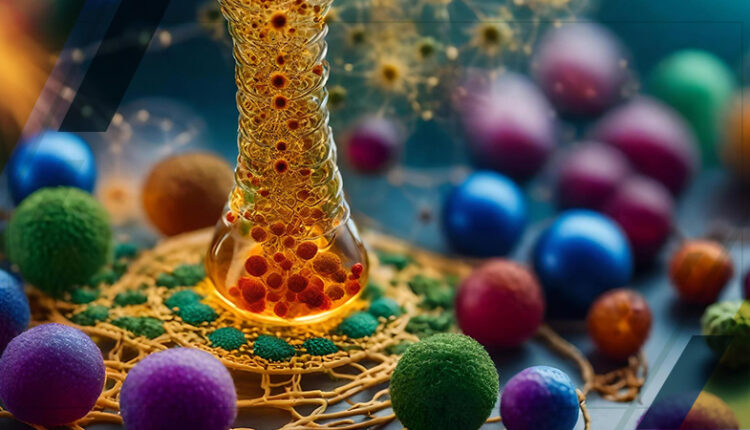Have you ever wondered how scientists are using the power of biology to create new and exciting things? Synthetic biology is a field where scientists combine biology and engineering to design and build living organisms that can do amazing things.
From agriculture to cosmetics, this revolutionary approach has changed various fields due to its significant potential. So, let’s explore the world of synthetic biology and learn about the incredible breakthroughs shaping its future.
What Exactly is Synthetic Biology?
Synthetic biology is a scientific field that revolves around modifying organisms in order to enhance their functionality by introducing new capabilities through genetic engineering. Researchers and companies specializing in synthetic biology across the globe are utilizing the inherent potential of the natural world to address challenges in areas such as healthcare, production, and farming.
Redesigning living organisms to create specific substances like medicine or fuel, or to acquire new capabilities, such as environmental sensing, is a key objective of synthetic biology endeavors.
What Makes Synthetic Biology and Genome Editing Different?
Synthetic biology is somewhat similar to genome editing. Both terms include modifying an organism’s genetic code. This way, both look the same, but the difference lies in how the genetic change is made.
Let me brief you in an easy way: Synthetic biology enables scientists to combine long stretches of DNA by stitching and inserting them into an organism’s genome. These synthesized DNA fragments could be genes found in other organisms or could be entirely novel. On the other hand, genome editing allows scientists to make minute changes in an organism’s DNA using instruments. These changes can include adding or deleting small DNA fragments in the genome.
Innovations in Synthetic Biology: Redefining the Future
● Innovative Advanced Materials
Synthetic biology enables the creation of responsive, multifunctional materials by combining biochemical components from living systems with inorganic elements. This method can improve protective clothing and building materials.
Understanding microbe communication helps improve assembly and tailoring properties. Combining synthetic biology with computational techniques helps design novel proteins that self-assemble into predicted shapes, fostering new opportunities for synthetic biology in materials science, medicine, and chemistry.
● Redefining Healthcare
Synthetic biology enhances vaccine safety and effectiveness by weakening viruses at the genetic level. It also aids drug development by generating artificial cell cultures that mimic human body parts. Additionally, synthetic biology reduces the virulence of disease vectors by modifying viral and bacterial DNA.
A recent example is that the U.S. Department of Defense is actively developing microbes for various applications, including tumor destruction, vaccine engineering, biofuel production, and renewable energy sources, under the Defense Advanced Research Projects Agency.
● Revolutionizing Fuel
Synthetic biology enables the production of biomaterials by modifying bacterial genes to utilize metabolic byproducts as alternatives to conventional materials.
These genetically modified microorganisms are utilized to produce a chemical used in rubber tire manufacturing that is obtained exclusively from petroleum.
Using biomaterials instead of petroleum-derived chemicals and fuels is an exciting application of synthetic biology.
● Shielding the Environment
Synthetic biology has diverse environmental applications aside from producing eco-friendly biomaterials for industry. A recent example is the American chestnut tree, which was genetically modified to resist blight, restoring its natural state.
The other example is ‘Golden Rice’, which is also genetically modified. This rice contains beta-carotene, a nutrient typically found in carrots, which helps prevent vitamin A deficiency. Vitamin A deficiency can lead to blindness in around 250,000 to 500,000 children each year and significantly raise their susceptibility to infectious diseases.
Additionally, these microorganisms have been utilized in bioremediation processes to effectively remove pollutants from our water, soil, and air, saving the earth and lives.
Similar plant alterations are transforming the agriculture sector.
● Saving Plant Lives
Various plants fall victim to molds, pests, or fungi. Wheat crops, for example, necessitate the use of pesticides. The use of genetic modifications in wheat farming reduces pesticide use and maintains high yields. Synthetic biology aids food production by growing animal cells for synthetic meat, eliminating the need to harvest from live animals.
Synthetic biology allows farmers to produce high-quality, nutrient-rich crops without compromising on quantity.
● A Beauty Enhancer
Synthetic biology has the potential to transform the beauty industry through personalized beauty products. This involves analyzing an individual’s genes and skin traits.
K18 Hair’s patented K18PEPTIDE, a high-performance ingredient, reverses hair damage. This syn-bio-based product gained over 20 million views in just four minutes on TikTok. Similarly, engineered yeast has been developed to produce rose oil, serving as an environment-friendly and sustainable alternative to natural roses utilized by perfumers in the creation of high-end fragrances.
Nature’s Blueprint
Synthetic biology represents a captivating frontier where science and imagination intertwine. With the power to engineer life itself, scientists are pushing the boundaries of what is possible and redefining our understanding of the natural world. From designing organisms that can produce life-saving medicines to creating sustainable solutions for a rapidly changing planet, synthetic biology holds immense promise for the future.


